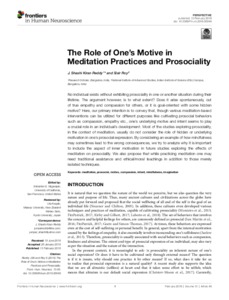Shashi Kiran Reddy, J and Roy, Sisir
(2019)
The Role of One’s Motive in Meditation Practices and Prosociality.
Frontiers in Human Neuroscience,, 13.
![[img]](http://eprints.nias.res.in/1757/1.hassmallThumbnailVersion/The-Role-of-One%E2%80%99s-Motive-in-Meditation-Practices-and-Prosociality.pdf)  Preview |
|
Text
The-Role-of-One’s-Motive-in-Meditation-Practices-and-Prosociality.pdf
- Published Version
Download (763kB)
| Preview
|
| Abstract: |
No individual exists without exhibiting prosociality in one or another situation during their lifetime. The argument however, is to what extent? Does it arise spontaneously, out of true empathy and compassion for others, or it is goal-oriented with some hidden motive? Here, our primary intention is to convey that, though various meditation-based interventions can be utilized for different purposes like cultivating prosocial behaviors such as compassion, empathy etc., one’s underlying motive and intent seems to play a crucial role in an individual’s development. Most of the studies exploring prosociality, in the context of meditation, usually do not consider the role of hidden or underlying motivation in one’s prosocial expression. By considering an example of how mindfulness may sometimes lead to the wrong consequences, we try to analyze why it is important to include the aspect of inner motivation in future studies exploring the effects of meditation on prosociality. We also propose that while practicing meditation one may need traditional assistance and ethical/moral teachings in addition to those merely isolated techniques. |
| Item Type: |
Journal Paper
|
| Keywords: |
compassion, imagination, intent, Meditation, mindfulness, motive, prosocial |
| Subjects: |
School of Humanities > Consciousness Studies |
| Divisions: |
Schools > Humanities |
| Date Deposited: |
13 Mar 2019 11:56 |
| Last Modified: |
13 Mar 2019 11:56 |
| Official URL: |
https://www.frontiersin.org/articles/10.3389/fnhum... |
| Related URLs: |
|
| Funders: |
UNSPECIFIED |
| Projects: |
UNSPECIFIED |
| DOI: |
|
| URI: |
http://eprints.nias.res.in/id/eprint/1757 |
Actions (login required)
 |
View Item |


